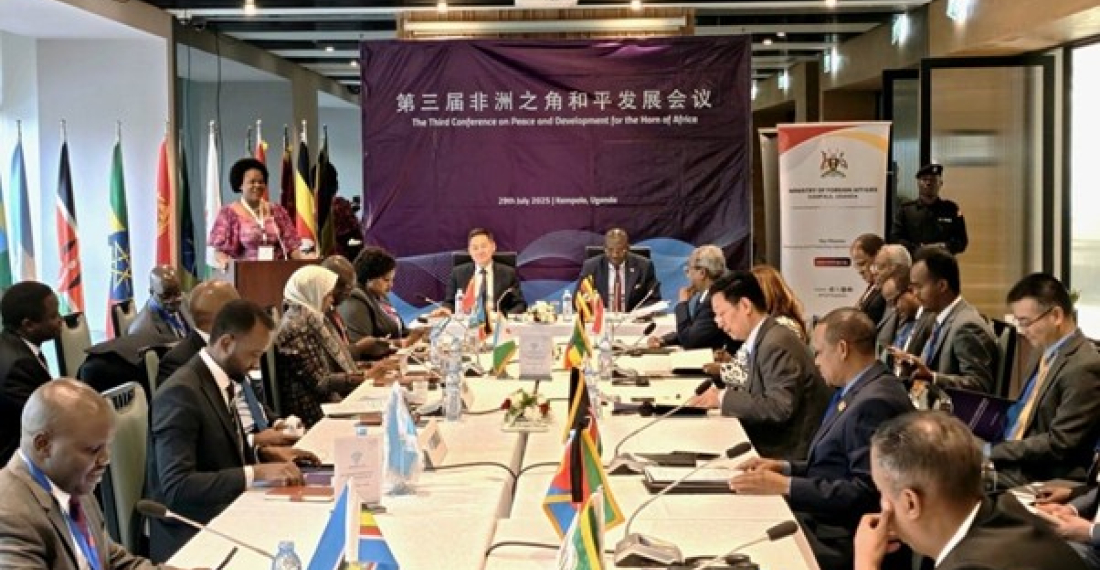Beijing’s special envoy for the Horn of Africa, Xue Bing, told a regional conference attended by eight governments from the region that ‘all parties should engage in dialogue’ to achieve common prosperity. In the meeting China reaffirmed its support for peaceful development in the Horn of Africa, saying it would “actively engage” in regional initiatives to promote the concept.
But analysts and observers are very skeptical. Whilst China might dabble with the region and its many problems, it ability to impact the situation, and particularly contribute to resolving the conflicts that plague the region is minimal.
In his speech at the Kampala Conference, Xue said Beijing would offer military assistance and training, as well as helping to develop the region’s infrastructure and boosting trade.
“The world today faces overlapping risks and challenges that threaten peace and development in the Horn of Africa, and all parties should engage in dialogue and cooperation to maintain universal security and achieve common prosperity,” Xue told the event, according to the Chinese foreign ministry.
Xue outlined further areas of cooperation, including counterterrorism and landmine eradication, while stressing China’s support for “African-led solutions” through platforms such as the African Union and the Intergovernmental Authority on Development.
At the China-led conference, which brought together regional countries including Djibouti, Eritrea, Ethiopia, Kenya, Somalia, South Sudan, Sudan and Uganda, Xue declared that “China is committed to actively engage with regional countries in various initiatives that promote peace and development.”
Under its Belt and Road Initiative, China has funded and built huge infrastructure projects in the region, including a railroad from the Ethiopian capital Addis Ababa to Djibouti.
Through its “peaceful development” concept for the Horn of Africa, China promotes economic development as a solution to problems in the region. It sees support for development and avoidance of direct involvement in these disputes as less risky and less likely to make enemies for China.
But, given the complex nature of conflicts in the region, such as the civil wars in Sudan and Ethiopia, analysts said China was likely to avoid direct intervention.
Xue was appointed in 2022 to help broker peace in the region, which includes China’s first overseas military base in Djibouti.
At the Kampala event, Xue said China was ready to negotiate and sign the Agreement on China-Africa Economic Partnership for Shared Development.
China also recently unveiled a plan to expand zero-tariff treatment for all African countries except for eSwatini, with which it does not have diplomatic relations.
“China will also encourage more Chinese enterprises to invest in the region, increase the added value of their products and localisation to boost economies and create jobs,” Xue said, according to Uganda’s foreign ministry.
At the opening ceremony, John Mulimba, Uganda’s minister of state for foreign affairs, thanked the Chinese government for its strong cooperation with Africa to promote peace and sustainable development, and for supporting a regional dialogue framework that emphasised African leadership.
Analysts said while Beijing’s attempts to link economic development to stability had helped frame its approach to the region, there were limitations to what it could do to solve the region’s conflicts.
David Shinn, a professor at George Washington University’s Elliott School of International Affairs, doubted whether China had the “expertise, resources, or even the will” to do so. He was quoted by the South China Morning Post as saying that “China has used most of these tools in the Horn of Africa in the past and they have had minimal impact”. “Whatever China can do to mitigate conflict in the Horn of Africa is welcome, but history suggests we should be realistic concerning the results.”
There are currently multiple conflicts in the Horn of Africa, and most countries that were present in the Kampala conference are affected.
Source: commonspace.eu with South China Morning Post (Hong Kong) and agencies.
Photo: The China led conference on the Horn of Africa held in Kampala at the end of July 2025 (picture courtesy of South China Morning Post, Hong Kong).







